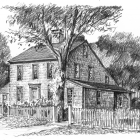Senate Candidates Debate Best Way to Address State’s Pension Fund Deficit
|
Candidates for the 26th and 36th State Senate Districts discussed how best to address Connecticut’s $100 million-plus pension fund deficit, which has been called one of the worst in the country, during a lively debate hosted by the New Canaan League of Women Voters Monday at Town Hall. “Our pension unfunded liabilities have more than doubled, from 87% of assets to 200% of assets, in 10 years,” explained Republican incumbent Sen. Toni Boucher, who seeks another term representing the 26th Senate District, before a packed house. “We’re putting ourselves a great risk. This [pension fund deficit] is something that is talked about in Wall Street and in the ratings agencies all the time.”
Finding a workable solution that is amenable to politicians on both side of the aisle, however, is “not going to be easy,” Boucher said. She said Governor Dannel Malloy’s recent decision to refinance the state’s unfunded pension obligations out another 30 years is “only going to exacerbate our problem” by “adding $11 billion in costs for taxpayers and future generations.”
“This is wrong – and [Gov. Malloy] did it without even adjusting and phasing-in a 401K plan to replace the defined benefit plan,” said Boucher, who serves as a Chief Deputy Senate Republican Majority Leader and is co-chair of the House Education and Transportation committees, as well as vice-chair of the Banking and Finance, Revenue and Bonding committees.



